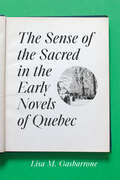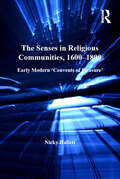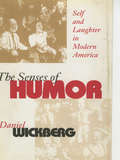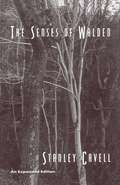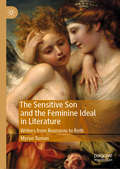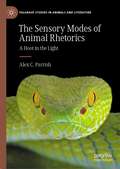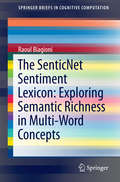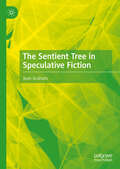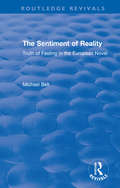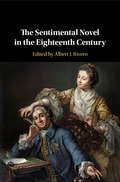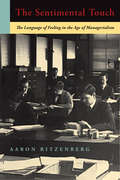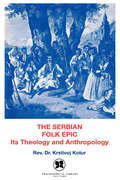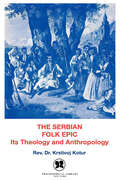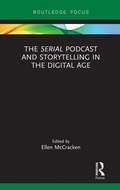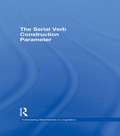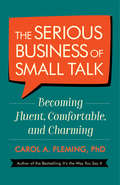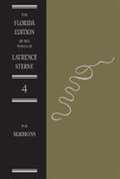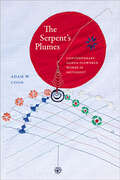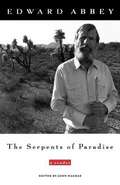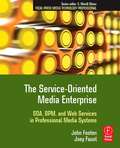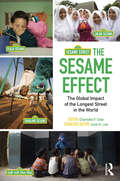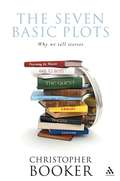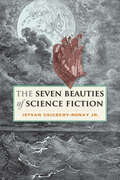- Table View
- List View
The Sense of the Sacred in the Early Novels of Quebec
by Lisa M. GasbarroneQuebec’s early novels are full of sacred themes and motifs – devotional objects and practices, parables and scripture, priests and nuns, transcendence, divinity, and eternity. Yet the critical gaze of the past fifty years has seldom engaged the idea of the sacred in a sustained way. Indeed the presence of the sacred has alienated modern and postmodern readers who ignore or downplay its significance, leading to misguided assessments of these works as mediocre and even unreadable for contemporary audiences.The Sense of the Sacred in the Early Novels of Quebec reexamines seven classic novels at the foundations of Quebec’s national literature: Patrice Lacombe’s La Terre paternelle (1846), P.-J.-O. Chauveau’s Charles Guérin (1853), Antoine Gérin-Lajoie’s Jean Rivard (1874), Philippe Aubert de Gaspé’s Les Anciens Canadiens (1863), Laure Conan’s Angéline de Montbrun (1884), Louis Hémon’s Maria Chapdelaine (1916), and Félix-Antoine Savard’s Menaud, maître-draveur (1937). Through chapters that focus on sacred themes, character analysis, narrative temporalities, and the hermeneutics of the sacred, Lisa Gasbarrone demonstrates that these novels are more nuanced and innovative than their reputation has allowed.*The Sense of the Sacred in the Early Novels of Quebec *reintroduces readers to classic works of French-Canadian literature that ironically and provocatively cast their quarrel with modernity in that essentially modern form: the novel.
The Senses in Religious Communities, 1600-1800: Early Modern ‘Convents of Pleasure’ (Women and Gender in the Early Modern World)
by Nicky HallettOffering a comprehensive analysis of newly-uncovered manuscripts from two English convents near Antwerp, this study gives unprecedented insight into the role of the senses in enclosed religious communities during the period 1600-1800. It draws on a range of previously unpublished writings-chronicles, confessions, letters, poetry, personal testimony of various kinds-to explore and challenge assumptions about sensory origins. Author Nicky Hallett undertakes an interdisciplinary investigation of a range of documents compiled by English nuns in exile in northern Europe. She analyzes vivid accounts they left of the spaces they inhabited and of their sensory architecture: the smells of corridors, of diseased and dying bodies, the sights and sounds of civic and community life, its textures and tastes; their understanding of it in the light of devotional discipline. This is material culture in the raw, providing access to a well-defined locale and the conditions that shaped sensory experience and understanding. Hallett examines the relationships between somatic and religious enclosure, and the role of the senses in devotional discipline and practice, considering the ways in which the women adapted to the austerities of convent life after childhoods in domestic households. She considers the enduring effects of habitus, in Bourdieu's terms the residue of socialised subjectivity which was (or was not) transferred to a contemplative career. To this discussion, she injects literary and cultural comparisons, considering inter alia how writers of fiction, and of domestic and devotional conduct books, represent the senses, and how the nuns' own reading shaped their personal knowledge. The Senses in Religious Communities, 1600-1800 opens fresh comparative perspectives on the Catholic domestic household as well as the convent, and on relationships between English and European philosophy, rhetorical, medical and devotional discourse.
The Senses of Humor: Self and Laughter in Modern America
by Daniel WickbergWhy do modern Americans believe in something called a sense of humor, and how did they come to that belief? Daniel Wickberg traces the relatively short cultural history of the concept to its British origins as a way to explore new conceptions of the self and social order in modern America. More than simply the history of an idea, Wickberg's study provides new insights into a peculiarly modern cultural sensibility. The expression "sense of humor" was first coined in the 1840s, and the idea that such a sense was a personality trait to be valued developed only in the 1870s. What is the relationship between medieval humoral medicine and this distinctively modern idea of the sense of humor? What has it meant in the past 125 years to declare that someone lacks a sense of humor? Why do modern Americans say it is a good thing not to take oneself seriously? How is the joke, as a twentieth-century quasi-literary form, different from the traditional folktale? Wickberg addresses these questions among others and in the process uses the history of ideas to throw new light on the way contemporary Americans think and speak about humor and laughter. The context of Wickberg's analysis is Anglo-American; the specifically British meanings of humor and laughter from the sixteenth century forward provide the framework for understanding American cultural values in the nineteenth and twentieth centuries. The genealogy of the sense of humor is, like the study of keywords, an avenue into a significant aspect of the cultural history of modernity. Drawing on a wide range of sources and disciplinary perspectives, Wickberg's analysis challenges many of the prevailing views of modern American culture and suggests a new model for cultural historians.
The Senses of Walden
by Stanley CavellStanley Cavell, one of America's most distinguished philosophers, has written an invaluable companion volume to Walden, a seminal book in our cultural heritage. This expanded edition includes two essays on Emerson.
The Senses of Walden: An Expanded Edition
by Stanley CavellStanley Cavell, one of America's most distinguished philosophers, has written an invaluable companion volume to Walden, a seminal book in our cultural heritage. This expanded edition includes two essays on Emerson.
The Sensitive Son and the Feminine Ideal in Literature: Writers from Rousseau to Roth
by Myron TumanThis book considers major male writers from the last three centuries whose relation to a strong, often distant woman—one sometimes modeled on their own mother—forms the romantic core of their greatest narratives. Myron Tuman explores the theory that there is an underlying psychological type, the sensitive son, connecting these otherwise diverse writers. The volume starts and ends with Jean-Jacques Rousseau, whose Confessions provides an early portrait of one such son. There are chapters on other adoring sons, Stendhal, Sacher-Masoch, Scott Fitzgerald, and Turgenev, as well as on sons like Bernard Shaw and D.H. Lawrence with a different, less affectionate psychological disposition toward women. This book demonstrates how, despite many differences, the best works of all these sensitive sons reflect the deep, contorted nature of their desire, a longing that often seems less for an actual woman than for an elusive feminine ideal.
The Sensory Modes of Animal Rhetorics: A Hoot in the Light (Palgrave Studies in Animals and Literature)
by Alex C. ParrishThe Sensory Modes of Animal Rhetorics: A Hoot in the Light presents the latest research in animal perception and cognition in the context of rhetorical theory. Alex C. Parrish explores the science of animal signaling that shows human and nonhuman animals share similar rhetorical strategies—such as communicating to manipulate or persuade—which suggests the vast impact sensory modalities have on communication in nature. The book demonstrates new ways of seeing humans and how we have separated ourselves from, and subjectified, the animal rhetor. This type of cross-species study allows us to trace the origins of our own persuasive behaviors, providing a deeper and more inclusive history of rhetoric than ever before.
The SenticNet Sentiment Lexicon: Exploring Semantic Richness in Multi-Word Concepts
by Raoul BiagioniThe research and its outcomes presented in this book, is about lexicon-based sentiment analysis. It uses single-, and multi-word concepts from the SenticNet sentiment lexicon as the source of sentiment information for the purpose of sentiment classification. In 6 chapters the book sheds light on the comparison of sentiment classification accuracy between single-word and multi-word concepts, for which a bespoke sentiment analysis system developed by the author was used. This book will be of interest to students, educators and researchers in the field of Sentic Computing.
The Sentient Tree in Speculative Fiction
by Jean GrahamThis book interrogates the theme of vegetal sentience and consciousness in the form of trees that move purposefully and/or speak, a theme which appears in everything from classical mythology to tTwentieth -century and contemporary literature, which draws on this earlier work. Graham's research includes literary and scientific works on vegetal consciousness and sentience, and applies this ecocritical lens in her analysis of various works of literature, television, and film. This book aims to illustrate how sentient trees in speculative fiction help readers better understand that other beings on Earth and/or the Universe are motivated and able to act on goals and desires, even when those goals may not coincide with those of humans.
The Sentiment of Reality: Truth of Feeling in the European Novel (Routledge Revivals)
by Michael BellOriginally published in 1983, The Sentiment of Reality covers the rise and decline of the realist novel from the mid-eighteenth century to the mid-twentieth century. The book takes the form of an extended essay on two closely related themes in the history of the novel: first, the impact and aftermath of the eighteenth-century cult of sentiment and, secondly, the supplanting of illusionism by an aesthetic of mimesis. This forms the basis of an exploration of the emotional impact that fiction has on the reader. Using this analysis, the book defends the realist tradition against common contemporary criticism. The Sentiment of Reality combines a close reading of key moments in European fiction with a wide-ranging speculative treatment of historical and formal questions.
The Sentimental Novel in the Eighteenth Century
by Albert J. RiveroAs a literary genre, the sentimental novel reached the height of its vogue in the 1770s and 1780s and was still popular as the eighteenth century drew to a close. This volume presents a comprehensive exploration of the sentimental novel in the eighteenth century, beginning with its origins in the so-called amatory fiction of the late seventeenth and early eighteenth centuries. Chapters from leading scholars combine the various aspects and contexts of the genre, from politics, slavery, women writers, and the Gothic to the sentimental novel in America, France and Germany, with historically informed close readings of novels by writers including Samuel Richardson (1689–1761), Laurence Sterne (1713–68) and Jane Austen (1775–1817). This volume demonstrates that the sentimental novel continues to engage readers and critics and that, far from being obsolete or only of antiquary interest, it remains a vibrant and exciting area of study.
The Sentimental Touch: The Language of Feeling in the Age of Managerialism
by Aaron RitzenbergBetween 1850 and 1940, with the rise of managerial capitalism in the United States, the most powerful businesses ceased to be family owned, instead becoming sprawling organizations controlled by complex bureaucracies. Sentimental literature—work written specifically to convey and inspire deep feeling—does not seem to fit with a swiftly bureaucratizing society. Surprisingly, though, sentimental language persisted in American literature, even as a culture of managed systems threatened to obscure the power of individual affect.The Sentimental Touch explores the strange, enduring power of sentimental language in the face of a rapidly changing culture. Analyzing novels by Harriet Beecher Stowe, Mark Twain, Sherwood Anderson, and Nathanael West, the book demonstrates that sentimental language changes but remains powerful, even in works by authors who self-consciously write against the sentimental tradition. Sentimental language has an afterlife, enduring in American literature long after authors and critics declared it dead, insisting that human feeling can resist a mechanizing culture and embodying, paradoxically, the way that literary conventions themselves become mechanical and systematic.
The Serbian Folk Epic
by Rev Krstivoj KoturThis is a thorough and well-documented study, examining the theology and anthropology of the Serbian folk epic. The book opens a new field in Slavic folklore and offers scholars material heretofore not readily available in English. The work sheds light also on the Serbian soul and culture. Conceptions of God, restlessness of the folk poet for the transcendental, the deep ontological, cosmic, and theurgic character of the heroes of the Serbian folk epic, man's destiny, man of culture or man of civilization, are just a few of the topics that the author has concerned himself with in this book.
The Serbian Folk Epic: Its Theology and Anthropology
by Rev. Krstivoj KoturThis scholarly study explores the moral and religious philosophy of Serbian folk poetry and makes its literary treasures available to English speakers. This thorough and well-documented study examines the theology and anthropology of the Serbian folk epic. The book opens a new field in Slavic folklore and offers scholars material previously unavailable in English. The work also sheds light on the soul of Serbian national culture. A scholar of Eastern European culture and history, Krstivoj Kotur investigates a number of fascinating topics, including conceptions of God; man&’s relationship to culture and civilization; the transcendentalism of Serbian folk poets; the deep ontological, cosmic, and theurgic character of the heroes of the Serbian folk epic; and many others.
The Serial Podcast and Storytelling in the Digital Age (Routledge Focus on Digital Media and Culture)
by Ellen McCrackenThis volume analyzes the Serial podcast, situating it in the trajectory of other popular crime narratives and contemporary cultural theory. Contributors focus on topics such as the ethics of the use of fiction techniques in investigative journalism, the epistemological overlay of postmodern indeterminacy, and the audience’s prolific activity in social media, examining the competing narrative strategies of the narrators, characters, and the audience. Other topics considered include the multiplication of narratives and the longing for closure, how our minds work as we experience true crime narratives, and what critical race theory can teach us about the program’s strategies.
The Serial Verb Construction Parameter (Outstanding Dissertations in Linguistics)
by Osamuyimen Thompson StewartAn investigation of the serial verb construction, this work engages central issues in syntactic theory-complex predicates, clausal architecture and syntactic variation.
The Serious Business of Small Talk: Becoming Fluent, Comfortable, and Charming
by Carol FlemingSmall Talk Is the Single Most Important Communication Skill You Can Develop Carol Fleming wants to show you that small talk is not as "small" as you might think. It's the foundation of every relationship, professional and personal. It is the sound of people reaching out to each other, searching for similarities, shared interests, goodwill, connections, and friendship. And it's something we all do every day with people we know. It's just the one little bit about strangers that throws some people off. Graceful social conversation can be learned, even by those requiring the smallest of baby steps.Fleming covers the inner and outer aspects—from the right attitude to how to dress, move around, and introduce yourself. Most importantly, she lays out a series of simple, memorable conversational strategies that make it easy to go from "Nice weather we're having" to a genuine, rewarding give-and-take. But she won't tell you what to say. Believe it or not, you already have what you need inside you. She merely provides the keys to unlock it. Small talk is the language of welcome, the extension of friendliness, the gracious acknowledgment of others, the kindly exchange of introductions and smiles, and the creation of a safe, courteous social space—and this is what has you terrified? After you read this book, you'll wonder what all the fuss was about.
The Sermons Of Laurence Sterne: The Text (Florida Edition Of The Works Of Laurence Sterne Series #4)
by Laurence Sterne Melvyn NewThis is a scholarly edition of Laurence Sterne's sermons. This volume contains the text of his 45 sermons.
The Serpent in the Cup: Temperance in American Literature
by David S. Reynolds Debra J. RosenthalArticles discussing alcoholism and its consequences
The Serpent's Plumes: Contemporary Nahua Flowered Words in Movement (SUNY series, Trans-Indigenous Decolonial Critiques)
by Adam W. CoonThe Serpent's Plumes analyzes contemporary Nahua cultural production, principally bilingual Nahuatl-Spanish xochitlajtoli, or "poetry," written from the 1980s to the present. Adam W. Coon draws on Nahua perspectives as a decolonizing theoretical framework to argue that Nahua writers deploy unique worldviews—namely, ixtlamatilistli ("knowledge with the face," which highlights the value of personal experiences); yoltlajlamikilistli ("knowledge with the heart," which underscores the importance of affective intelligence); and tlaixpan ("that which is in front," which presents the past as lying ahead of a subject rather than behind). The views of ixtlamatilistli, yoltlajlamikilistli, and tlaixpan are key in Nahua struggles and effectively challenge those who attempt to marginalize Native knowledge production.
The Serpents of Paradise
by Edward AbbeyThe selections gathered here are arranged chronologically by incident, not by date of publication, to offer Edward Abbey's life from the time he was the boy called Ned in Home, Pennsylvania, until his death in Tucson at age 62.
The Service-Oriented Media Enterprise: SOA, BPM, and Web Services in Professional Media Systems
by John Footen Joey FaustCompanies worldwide are rapidly adopting Service-Oriented Architecture (SOA), a design methodology used to connect systems as services, and Business Process Management (BPM), the art of orchestrating these services. Media organizations from news organizations to music and media download services to movie studios are adapting to SOA-style architectures, but have run into roadblocks unique to the media and entertainment industry. These challenges include incorporating real-time data, moving large amounts of data at one time, non-linearity and flexibility for workflow, and unique metrics and data gathering. The Service-Oriented Media Enterprise details the challenges and presents solutions for media technology professionals. By addressing both the IT and media aspects, it helps individuals improve current enterprise technologies and operations.
The Sesame Effect: The Global Impact of the Longest Street in the World
by Charlotte F. Cole June H. LeeThe Sesame Effect details the wide-ranging work of Sesame Workshop and its productions across the world. With an emphasis on impact and evidence from research on projects in low- and middle-income countries, the book tells the stories behind the development of an international family of Muppet characters created for the locally produced adaptations of Sesame Street. Each chapter highlights the educational message of international co-productions and presents the cultural context of each project. Readers will understand the specific needs of children living in a given locale, as well as gain insight into the educational drivers of each project. These projects often deal with difficult issues, from race relations in the United States, to HIV/AIDS education in South Africa, to building respect across cultural divides in the Middle East. Readers will see how local productions have helped build a new mindset that values the importance of early childhood education, and how Sesame Street promotes a brighter future by building children’s academic skills, encouraging healthy habits, and by fostering attitudes that counter negative stereotypes and create appreciation of and respect for others. The Sesame Effect shows how, when magnified across the millions of children touched by the various international programs, Sesame Workshop and its projects are making a difference around the world.
The Seven Basic Plots: Why We Tell Stories
by Christopher BookerAnalysis of the basic concepts behind the fiction we read.
The Seven Beauties of Science Fiction
by Istvan Csicsery-Ronay Jr.This major critical work from one of the preeminent voices in science fiction scholarship reframes the genre as a way of understanding today’s world.As the application of technoscience increasingly transforms every aspect of life, science fiction has become an essential mode of imagining the horizons of possibility. Though the broad scope of science fiction may vary in artistic quality and sophistication, it shares a desire to imagine a collective future for the human species and the world. A strikingly high proportion of today’s films, commercial art, popular music, video games, and non-genre fiction are what Csicsery-Ronay calls “science fictional” —stimulating science-fictional habits of mind. We no longer treat science fiction as merely a genre-engine producing formulaic effects, but as a mode of awareness, which frames experiences as if they were aspects of science fiction. The Seven Beauties of Science Fiction describes science fiction as a constellation of seven diverse cognitive attractions that are particularly formative of science-fictionality. These are the “seven beauties” of the title: fictive neology, fictive novums, future history, imaginary science, the science-fictional sublime, the science-fictional grotesque, and the Technologiade, or the epic of technoscience’s development into a global regime.
